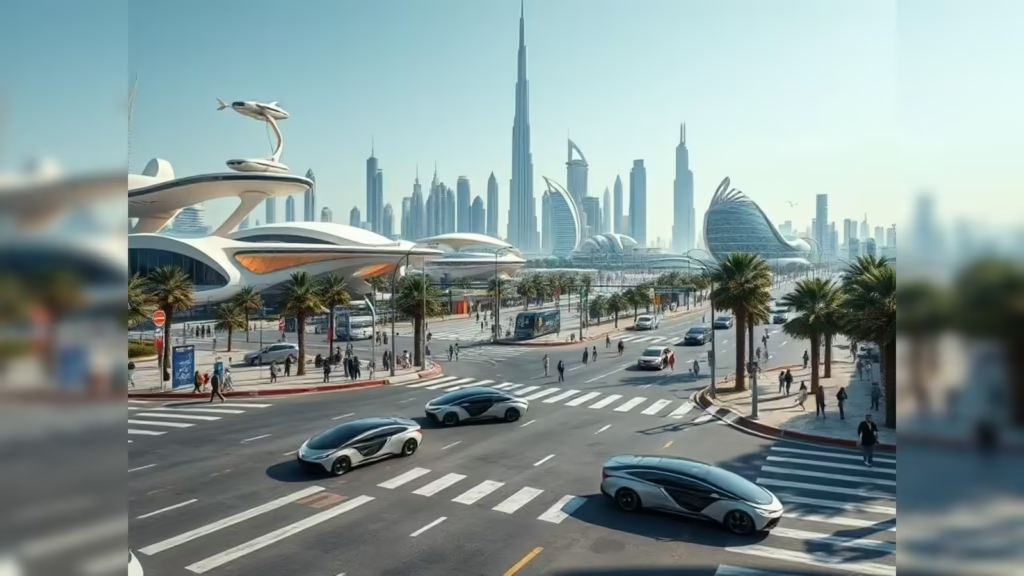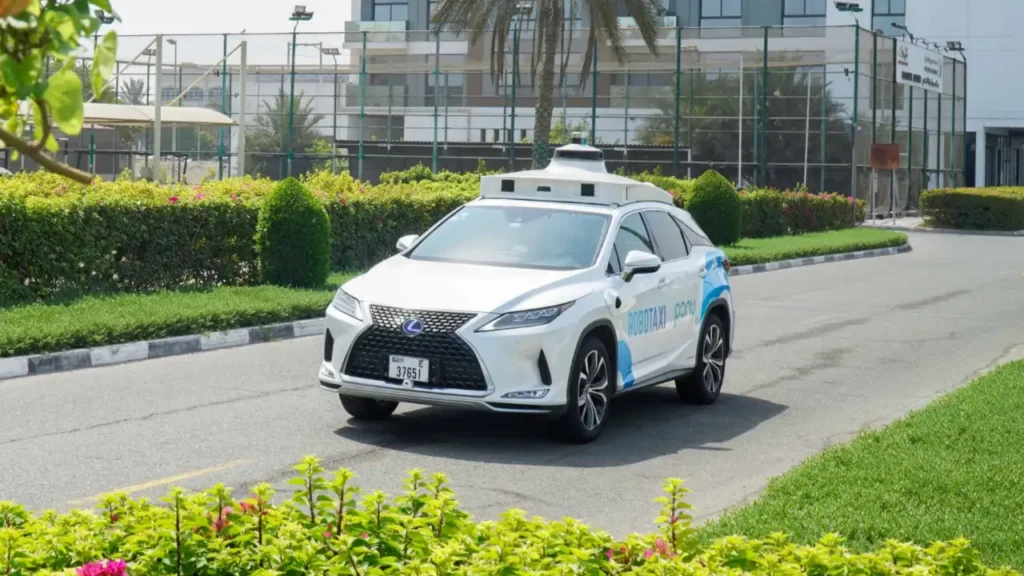Dubai has never been shy about chasing the future. From towering skyscrapers to man-made islands and AI-powered police robots, this city loves to be ahead of the curve. Now, it’s taking a bold leap into autonomous transport, with self-driving cars about to hit its streets in pilot trials scheduled for later this year. The Roads and Transport Authority (RTA) of Dubai has announced its partnership with Pony.ai, one of the global leaders in autonomous vehicle technology, to make this ambitious plan a reality.
If all goes according to plan, Dubai aims to roll out a full-fledged driverless taxi service by 2026. Even more impressively, the city envisions that by 2030, 25% of all transportation trips will be made through autonomous vehicles. It’s a futuristic goal designed to reshape urban life, ease traffic congestion, and improve the overall quality of life for both residents and tourists.
A New Chapter for Urban Mobility

For a city that already boasts the world’s tallest building and one of the busiest airports on the planet, Dubai’s dive into self-driving cars feels like a natural next step. The introduction of autonomous taxis isn’t just a flashy tech upgrade — it’s part of a well-thought-out vision to create smarter, safer, and more efficient streets.
The pilot program will initially focus on select areas, with a small fleet of driverless vehicles operating under controlled conditions. These trials are intended to gather valuable data, test safety protocols, and gauge public response. Based on these insights, the service will gradually expand its coverage and eventually become a mainstream part of Dubai’s transport system.

Meet Pony.ai — Dubai’s New Tech Partner
At the heart of this futuristic project is Pony.ai, a cutting-edge autonomous vehicle technology company known for developing advanced AI-driven driving systems. With headquarters in Silicon Valley and a strong presence in China, Pony.ai has already tested its autonomous vehicles in major cities like Beijing, Shanghai, and Los Angeles.
Now, the company is bringing its expertise to Dubai. The vehicles will be equipped with sensors, cameras, and LiDAR systems, allowing them to navigate traffic, avoid obstacles, and make real-time decisions on the road — all without human intervention. This collaboration marks the first time that Pony.ai will operate in the Middle East, adding yet another milestone to its growing list of achievements.
Why Dubai Is Betting Big on Autonomous Taxis
Dubai isn’t adopting self-driving cars just for the tech bragging rights. There’s a genuine, practical strategy behind it. The city faces growing transportation demands as its population rises and tourism flourishes. Traffic congestion and carbon emissions are major urban headaches that require innovative solutions.
By integrating autonomous taxis into the transportation network, Dubai hopes to make travel safer, faster, and more efficient. These vehicles won’t get tired, distracted, or need coffee breaks. They’ll stick to traffic rules, reduce accidents caused by human error, and potentially cut travel times by choosing optimal routes in real time.
In addition, driverless taxis could also lower transportation costs for users over time, as operational expenses for autonomous vehicles are expected to decrease with technological advancements.
A Step Toward Dubai’s 2030 Smart Mobility Vision
This driverless taxi initiative is part of Dubai’s broader Smart Mobility Strategy, a plan designed to integrate smart technology into every aspect of urban life. By 2030, Dubai’s government wants one in every four trips to be made through autonomous means — whether it’s a self-driving car, drone taxi, or autonomous shuttle.
The RTA believes that embracing driverless vehicles will not only modernise the city’s transport infrastructure but also elevate the overall quality of life. Reduced road accidents, lower carbon emissions, and less time wasted in traffic jams are among the top benefits.
And let’s not forget the wow factor. Dubai has built its reputation as a global trendsetter, and being one of the first cities to launch a large-scale driverless taxi service will only enhance its futuristic image.
How Will These Driverless Taxis Work?
So, how exactly will these autonomous taxis operate? The cars will use a combination of sensors, radar, cameras, and artificial intelligence to detect road conditions, read traffic signals, and avoid pedestrians or other vehicles. The system is designed to handle a variety of urban driving challenges, from navigating tight city streets to merging onto busy highways.
Users will be able to book these taxis via a dedicated app, similar to how ride-hailing services like Uber and Careem work today. Passengers can select pick-up and drop-off points, track their ride in real-time, and even control certain in-car settings from their phones.
During the pilot phase, safety drivers might still be present behind the wheel, ready to intervene if necessary. But as the system proves its reliability, the goal is to phase out the need for human drivers entirely.

Public Response and Expectations
Naturally, the idea of getting into a car without a driver can feel a little nerve-wracking for some people. Concerns about safety, reliability, and how these cars will handle unpredictable traffic situations are common.
However, Dubai’s residents are no strangers to ambitious projects. From robot cops to vertical farms, the city’s population has grown accustomed to technological innovation. Early public surveys and reactions suggest a mix of excitement and curiosity, with many people eager to experience a ride in one of these futuristic vehicles.
The RTA plans to host public demonstrations and trial rides to help build trust and familiarity with the technology before the service fully rolls out.
What It Means for the Future of Jobs
One of the biggest questions surrounding the rise of driverless taxis is their impact on employment. The transportation sector currently provides jobs for thousands of drivers across Dubai. As autonomous vehicles become more widespread, there’s understandable concern about potential job losses.
Dubai’s government acknowledges these concerns and has highlighted the importance of upskilling and retraining opportunities for those affected. New job roles will likely emerge in areas like fleet management, vehicle maintenance, AI system monitoring, and transportation data analysis.
Rather than eliminating jobs entirely, the aim is to shift employment opportunities toward more tech-focused and supervisory roles that support the new driverless ecosystem.
Dubai’s Place in the Global Autonomous Race
Dubai isn’t alone in its pursuit of driverless transport. Cities like San Francisco, Beijing, and Singapore have already launched limited autonomous taxi services. But what makes Dubai’s project stand out is the scale and speed of its ambition.
While other cities typically focus on small, carefully controlled trials, Dubai is targeting a citywide rollout by 2026. Combined with its plan to make 25% of all trips autonomous by 2030, the emirate is positioning itself as one of the most advanced smart mobility cities in the world.
Given its strong government support, strategic partnerships, and culture of embracing innovation, Dubai has a good chance of achieving these ambitious milestones.
A Glimpse into the City of Tomorrow
The upcoming pilot trials of self-driving cars in Dubai are more than just a tech experiment. They’re a glimpse into the city of tomorrow — a place where AI-driven taxis whisk passengers around sleek, traffic-free roads while drones deliver packages overhead.
It’s an exciting, slightly surreal vision of the future, and it’s happening sooner than many people expected. With its driverless taxi service set to debut by 2026 and a quarter of all trips planned to be autonomous by 2030, Dubai is proving once again that it’s not just dreaming about the future — it’s building it.
For residents and tourists alike, the prospect of stepping into a driverless car for a smooth, safe, and convenient ride around one of the world’s most dynamic cities is no longer a distant fantasy. It’s right around the corner.

Final Thoughts
As Dubai gears up to trial its first self-driving cars later this year, it marks the start of an exciting new chapter for the city’s transport network. From reducing traffic congestion to lowering accident rates and cutting carbon emissions, the benefits of autonomous taxis are hard to ignore.
Of course, challenges remain — from public acceptance to regulatory hurdles — but if any city can turn bold ideas into everyday reality, it’s Dubai.
So, whether you’re a local resident, frequent tourist, or curious tech enthusiast, keep an eye out. The next time you hail a ride in Dubai, it might just arrive without a driver.
Follow us on Instagram: UAE STORIES













